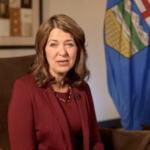Canadian Politics, Gender Ideology
The Canadian media is at war with Canadian parents. Children are at stake.
As multiple provinces move to protect parental rights, the Canadian press is ramping up their propaganda campaign on behalf of the transgender movement. Regular readers of this column will know that I’ve written quite a bit on this unfolding press campaign. That’s because what we’re watching is a gaslighting in real time, and I think it is very important to clearly identify what the media is up to. I’ve noted that the Toronto Star calls parents knowing their child’s “gender identity” a “privilege;” the Globe and Mail claiming that resolutions at the Conservative Party convention threaten the lives of children; nearly the entire press corps targeting politicians who dare to stand up for parents and their children.
The latest is a long-form piece by the CBC published on September 18 titled “Trans teens and youth say gender-affirming care is ‘life-changing.’ So why is it so hard to find in Canada?” While not mentioning it explicitly, this article is clearly in response to a Conservative Party convention resolution — which passed by a large margin — to condemn sex changes for minors. Here’s how the article opens:
Crow Heyden-Kaye was in Grade 8 when a worksheet handed out during class asked students to consider how they would describe their gender.
It was the first time it occurred to Crow that “girl” didn’t actually fit with how he felt. Over the next few years, he began using the pronouns they and them. In Grade 10, he came out as trans. His pronouns are “he” and “they.”
This, in so many words, is precisely what so many parents are concerned about — that children who might struggle with their identity (as many do) may have the idea that they were simply born in the wrong body planted in their minds by LGBT curriculum. Identity struggles are not new; school staff facilitating social transition and sex changes is. Before this assignment, Heyden-Kaye hadn’t considered not being a girl. But after the assignment, it “occurred to Crow” that perhaps “girl” wasn’t an accurate describer of … well, feelings. How adults respond to gender confusion in children can determine their trajectory. More:
At 16, he asked his mom to make an appointment with their longtime family doctor so he could get a referral to a gender clinic. He wanted to start exploring the possibility of hormone replacement therapy.
But during the telephone appointment, the family doctor began asking questions Heyden-Kaye felt were inappropriate.
“What if I wanted to get pregnant someday? What if I had a husband someday? Not related at all,” he said. “I think he asked me ‘What if you want to keep your boobs?’ ”
A week later, a staff member from the doctor’s office called back and said the physician was also recommending that Heyden-Kaye read a book that discouraged transitioning.
Again — this illustrates how dangerous transgender ideology is. Around 80% of children who struggle with gender dysphoria desist naturally and become comfortable in their bodies — but now, the trans movement encourages these feelings, affirms them, and hastens to usher them on the path to lifelong medicalization. Hayden-Kaye’s “longtime family doctor” did precisely what a family doctor should — he highlighted the long-term, permanent consequences of what was being asked of him. Sex-change “treatments” nearly always render the patient infertile, and often eliminate their ability to experience sexual pleasure.
READ THE REST OF THIS COLUMN HERE








